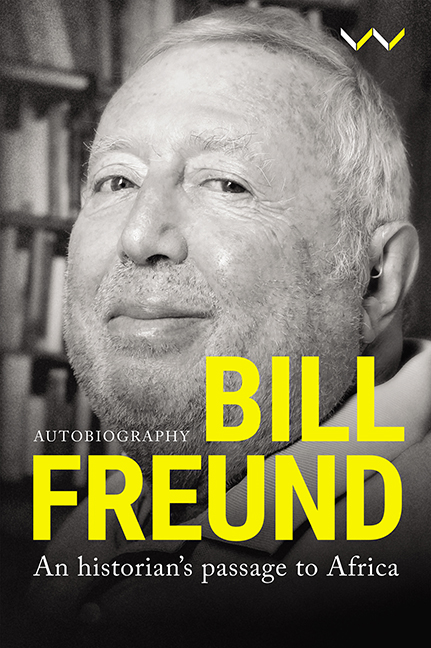Book contents
- Frontmatter
- Contents
- Foreword: Bill Freund and the Making of His Autobiography
- Family Tree
- A Brief Introduction
- 1 The Austrian Past
- 2 The Aftermath of War: A Perilous Modernity
- 3 The Dark Years
- 4 A New Life in America
- 5 Adolescence: First Bridge to a Wider World
- 6 As a Student: Chicago and Yale
- 7 As a Student: Africa and England
- 8 The Tough Years Begin
- 9 An Intellectual and an African: Nigeria
- 10 An Intellectual and an African: Dar es Salaam and Harvard
- 11 South Africa, My Home
- Notes
- Select Bibliography of Bill Freund’s Publications
- List of Illustrations
- Author’s Acknowledgements
- Supplementary Acknowledgements
- Index
6 - As a Student: Chicago and Yale
Published online by Cambridge University Press: 15 June 2021
- Frontmatter
- Contents
- Foreword: Bill Freund and the Making of His Autobiography
- Family Tree
- A Brief Introduction
- 1 The Austrian Past
- 2 The Aftermath of War: A Perilous Modernity
- 3 The Dark Years
- 4 A New Life in America
- 5 Adolescence: First Bridge to a Wider World
- 6 As a Student: Chicago and Yale
- 7 As a Student: Africa and England
- 8 The Tough Years Begin
- 9 An Intellectual and an African: Nigeria
- 10 An Intellectual and an African: Dar es Salaam and Harvard
- 11 South Africa, My Home
- Notes
- Select Bibliography of Bill Freund’s Publications
- List of Illustrations
- Author’s Acknowledgements
- Supplementary Acknowledgements
- Index
Summary
My mother's family originally lived in Hyde Park when they first came from Vienna to Chicago and so did quite a few others from central Europe. In 1962 I returned here in a new capacity to start a very different kind of life as a University of Chicago undergraduate. Hyde Park was such a distinctive neighbourhood that it needs some attention to describe.
In the 1940s two major changes transformed this setting. Robert Hutchins, president of the university, became convinced, notably by Mortimer Adler, whose edition of what he considered the ultimate Western classics – ‘the Great Books’ – was then available, that US undergraduate education was superficial and pandered to the pleasures of an intellectually mediocre middle class. As a result, he introduced a curriculum that consisted exclusively of the ‘Great Books’. You took an entrance exam to get in, regardless of whether you had a high school diploma or not, and when you finished the Great Books repertoire of courses – very demanding – you got a degree. From being in large part a university to which students either commuted or where they lived in fraternity or sorority houses, it became the site of a network of student apartments in which the university interfered not at all in the lives of their residents. This was a genuinely liberal environment and as a result it attracted students from academic and from left-wing families, including underground Communists. A symbolic Hutchins gesture was the dissolution of intercollegiate football, so rife with the symbolism of college as a middle-class resort of pleasure for male youth. Hutchins famously said that when the need for exercise arose in him, he would take a nap until the urge disappeared. One result is that enrolments fell drastically. However, there was generous scholarship money available for a large part of the undergraduates, and the professional schools such as Law and Medicine held their reputation as outstanding in the Middle West. Only a third of the students in my time were in fact undergraduates.
At the same time, the city of Chicago was also changing. Wartime brought many black families north up the Mississippi Valley and it was no longer possible to house them, even in crowded and overpriced apartments, on the South Side ‘Black Belt’.
- Type
- Chapter
- Information
- Bill FreundAn Historian's Passage to Africa, pp. 73 - 94Publisher: Wits University PressPrint publication year: 2021

